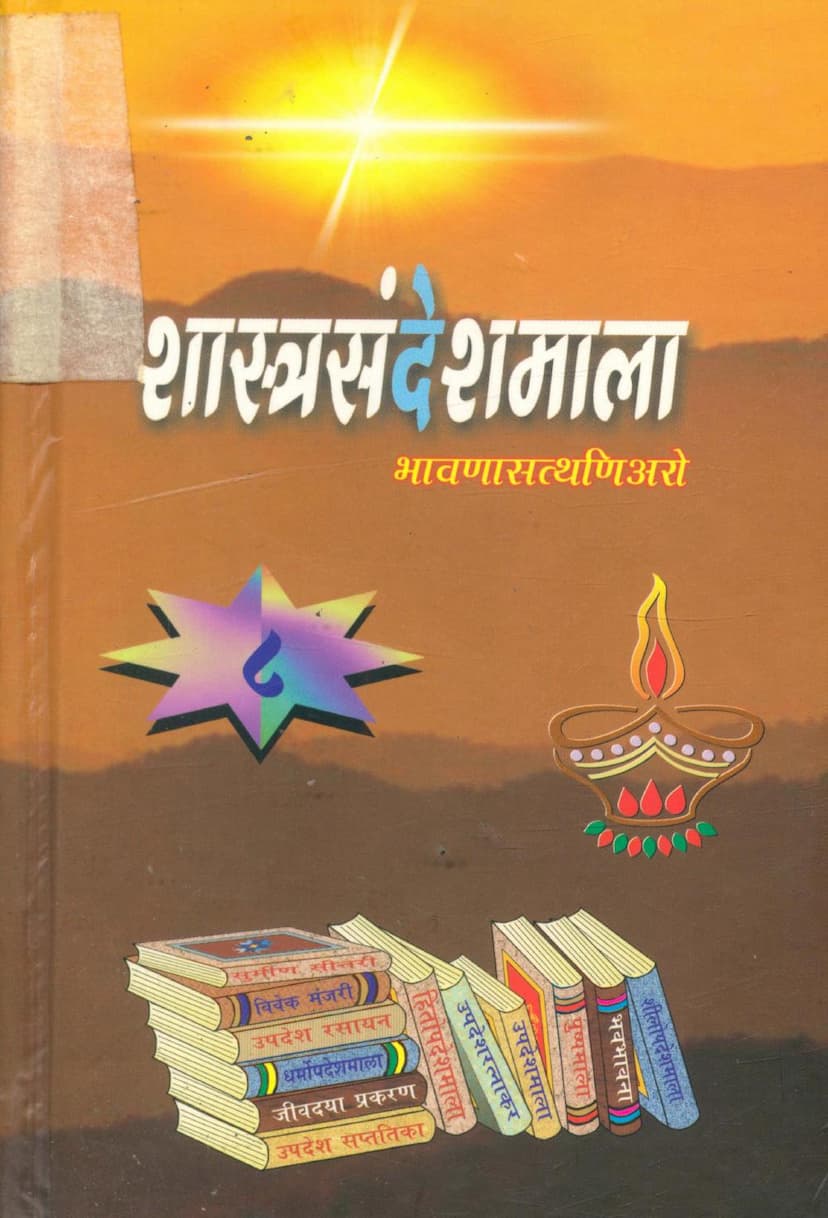Shastra Sandesh Mala Part 08
Added to library: September 2, 2025

Summary
This document is a collection of Jain texts, primarily focused on ethical teachings and spiritual guidance, compiled and published by Shastra Sandesh Mala. Here's a breakdown of the key information:
Book Title: Shastra Sandesh Mala Part 08
Author: Vinayrakshitvijay
Publisher: Shastra Sandesh Mala, Surat
Catalog Link: https://jainqq.org/explore/004458/1
Content Summary:
The document is the eighth part of the "Shastra Sandesh Mala" series, compiled by Vinayrakshitvijay under the guidance of Panyas Shri Bodhiratnavijayji Maharaj Saheb, who is a disciple of Acharya Shrimad Vijay Ramachandrasurishwarji. The publication is dedicated to preserving and disseminating Jain scriptures.
Key Themes and Texts within the Volume:
- Emphasis on Action (Kriya): Page 5 features a quote from Acharya Shrimad Vijay Ramachandrasurishwarji emphasizing that "There is no Moksha without action." It clarifies that true detachment from worldly pleasures, renunciation of passions, and devotion to virtues lead to a state where action becomes natural, and eventually, even action is not needed for the liberated soul. The text stresses that actions prescribed by the scriptures are necessary for attaining liberation.
- Compendium of Jain Ethical and Spiritual Texts: The index on pages 8 and 9 reveals a comprehensive collection of 23 distinct Jain works, covering various aspects of Jain philosophy and practice. These include:
- Instructional and Ethical Treatises: Texts like "Upadesh Mala," "Upadesh Ratnakar," "Shilopadesh Mala," "Dharma Upadesh Mala," "Dhanopadesh Mala," "Charitra Manorath Mala," "Yati Shiksha Panchashika," "Upadesh Saptatika," "Upadesh Ratnakosh," and "Akkhyan Manikosh" focus on guiding conduct and moral development.
- Texts on Detachment and Devotion: Works such as "Vairagya Rasayan" and "Upadesh (Dharma) Rasayan Ras" delve into the principles of renunciation and spiritual practice.
- Texts on Daily Life and Virtues: "Bhojan Purva Chinta Gatha" (contemplation before meals) and "Stri Vastavikta Prakaran" (reality of women) suggest practical advice for daily living.
- Texts on Key Jain Concepts: "Vivek Manjari" (flower of wisdom) and "Jeev Daya Prakaran" (chapter on compassion for living beings) highlight essential Jain principles.
- Praise of Jain Ascetics and Practices: Many verses throughout the text offer praise for the disciplined lives of monks (sadhu) and nuns (sadhvi), emphasizing their endurance, renunciation, and devotion.
- Narrative Examples: The text draws upon numerous stories and examples from Jain history and lore to illustrate spiritual principles and the consequences of actions. These include references to historical figures like Bahubali, Bharata Chakravarti, Shalibhadra, and various revered monks and nuns.
- Structure and Content: The volume appears to be a collection of verses or couplets, each numbered and often presenting a specific teaching, moral, or anecdote. The language used is likely an older form of Gujarati or Prakrit, common in classical Jain literature. The sheer volume of verses (3730 in total) indicates a deep dive into various spiritual and ethical topics.
- Commitment to Accuracy: The publication emphasizes its dedication to purity and accuracy, noting that the texts were reviewed and corrected by respected scholars and monks, including Pandit Shri Ratibhai Chimanlal Doshi and Pujya Shri Hitrakshitvijayji Maharajsaheb.
- Financial Support: The publication acknowledges the financial support of the Surat Tapgachh Ratna Aradhak Sangh and other Sanghas, who generously contributed from their "Gyan Dravya" (knowledge funds).
Overall Purpose:
The "Shastra Sandesh Mala Part 08" serves as a valuable resource for Jain scholars and practitioners, offering a wide array of teachings and examples aimed at fostering ethical conduct, spiritual understanding, and ultimately, liberation (Moksha) according to Jain principles. It showcases the richness and diversity of Jain literature and the dedication of the community to its preservation and dissemination.